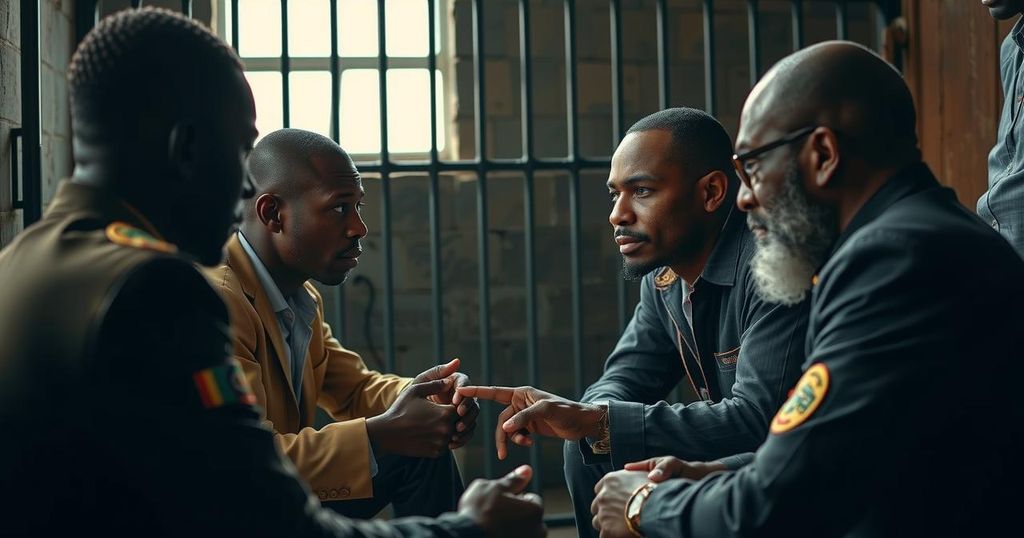Opposition leader Bobi Wine visited Kizza Besigye in jail, stating he was in good spirits. Wine condemned the Ugandan government’s actions and called on Kenya to take corrective measures. The Ugandan spokesperson asserted that Besigye’s arrest in Kenya was conducted with Nairobi’s knowledge, amidst rising international criticism. Besigye faces military charges and remains in custody until December 2, as global rights organizations condemn the situation.
On Friday, Uganda’s opposition leader, Robert Kyagulanyi, widely known as Bobi Wine, visited fellow opposition figure Kizza Besigye in jail and reported that Besigye was in “good spirits.” Wine condemned the Ugandan government’s actions concerning Besigye’s recent abduction and arrest and urged the Kenyan government to implement corrective measures to prevent similar incidents in the future. Besigye’s arrest in Kenya has drawn significant international scrutiny, as it raises concerns over political persecution in the region.
Chris Baryomunsi, the Ugandan government spokesperson, confirmed that the arrest of Besigye in Kenya was executed with the knowledge of the Kenyan authorities. This confirmation followed a statement from a senior Kenyan official about an investigation into the matter. Initial denials from Kenyan officials regarding their involvement have complicated the narrative surrounding Besigye’s arrest, who was abducted in Nairobi before being presented in a Kampala court.
Baryomunsi remarked, “Without Kenya’s involvement, it would not have been possible for Besigye to cross into Uganda,” reinforcing that both nations routinely share intelligence that benefits their bilateral relations. This statement aligns with remarks made by Korir Sing’Oei, the permanent secretary of Kenya’s foreign ministry, who expressed regret regarding the incident and confirmed that an investigation has been initiated.
Besigye appeared in a military tribunal on Wednesday, where he faced charges including the possession of firearms and allegedly soliciting international support to undermine Uganda’s national security, charges he has firmly denied. He maintained that, being a civilian, he should not be tried by a military court and was subsequently remanded to Luzira prison until December 2.
The Ugandan government defends its actions by citing international treaties that permit extraditions, thereby justifying the cross-border arrest. The situation has evoked significant concern, with UN Secretary-General Antonio Guterres’ spokesperson expressing “extreme concern” over Besigye’s treatment. Human rights organizations, including Amnesty International, condemned the abduction, labeling it part of a dangerous trend of “transnational repression” observed in Kenya.
The political landscape in Uganda has been increasingly characterized by the government’s repression of dissenting voices, particularly those of opposition leaders. Kizza Besigye has been a long-time critic of President Yoweri Museveni and has been subjected to repeated arrests and charges aimed at stifling political opposition. The recent incident of his abduction in Kenya and subsequent extradition to Uganda raises significant concerns regarding international cooperation that enables political persecution. Furthermore, the response from the governments of Uganda and Kenya underscores the complex dynamics at play in regional politics, amidst growing international scrutiny and condemnation.
The recent abduction of Kizza Besigye in Kenya has sparked outrage and concern over political repression in Uganda. Prominent opposition leader Bobi Wine has publicly condemned the actions of both the Ugandan and Kenyan governments, calling for reforms to prevent such incidents in the future. This event highlights serious issues of cross-border political persecution and the role of international relations in facilitating such actions. The situation remains dire as opposition leaders continue to face severe scrutiny and repression.
Original Source: newscentral.africa







